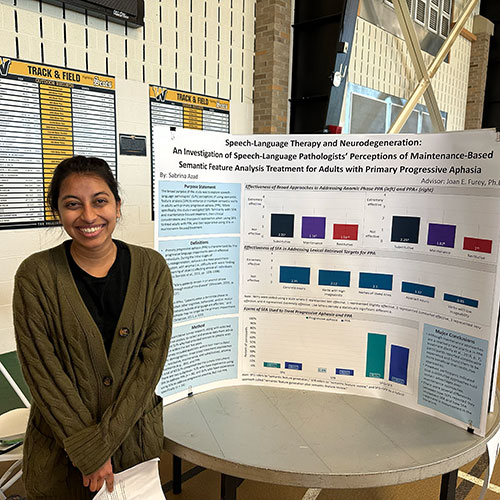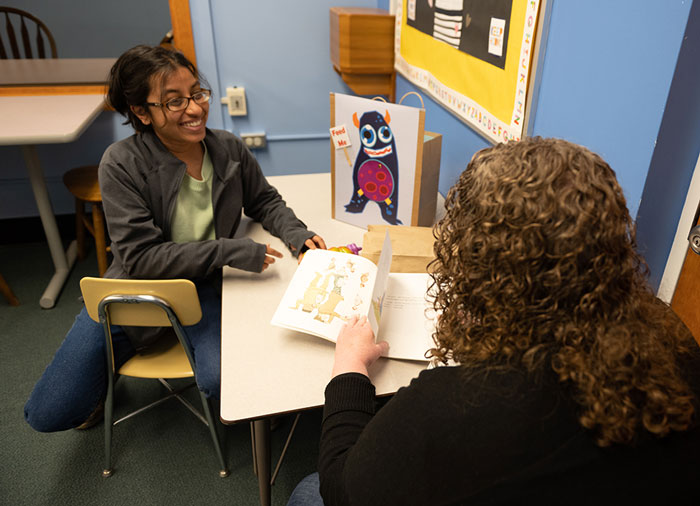
Communication sciences and disorders major explores alternative approaches to support patients

Aspiring speech-language pathologist Sabrina Azad ’24 wanted to focus her Independent Study research on understanding how to support patients with brain diseases that can continue to cause the deterioration of brain cells.
“A speech-language pathologist’s role is to promote functional communication, but what does that look like when ultimately the prognosis is a decline in health?” Azad said. “We’ll consider the goal of treatment, the broad treatment approach, and what’s the intervention?”
Azad found that for patients struggling with progressive aphasia or language impairments like those from Alzheimer’s disease or other types of demintia, a maintenance approach can be a proactive treatment. “Restitutive interventions have to do with rehabilitating, and they capitalize on the notion that the patient has neuroplasticity—they have the ability to relearn. That’s not something that a person with primary progressive aphasia has a robust ability to do because of the dementia.”
Instead, she explained the need to use a substitutive/compensatory treatment approach. “Clinicians value strategies for supporting the client before it gets too far and should support them with strategies and materials that they can depend on later on,” she said. “For example, I might say to the patient, ‘I’m going to have a conversation about the things that are important to you, and we’re going to create a memory book, because when this condition has advanced, you can reflect on this memory book with your caregivers.’”
Q: What excites you about your I.S.?
Azad: I am especially interested in the speech-language pathologist’s role when serving individuals with progressive impairments. Not only is there a broad range of neurodegenerative diseases with differential impacts to communication and swallowing, but intervention must also be further specified by a client’s unique disease progression. I learned that speech-language pathologists can use semantic feature analysis to address the individual needs of patients with primary progressive aphasia.
Q: How did Wooster prepare you for I.S.?
Azad: The foundational knowledge through my courses in communication sciences and disorders, experiential learning opportunities, and extensive support throughout the I.S. process prepared me for I.S. and gave me an edge when applying for my master’s in speech-language pathology.
Q: How did your I.S. mentor support you as you completed your project?
Azad: Dr. Furey, my I.S. mentor, went above and beyond to guide me through the I.S. process. I was able to depend on and learn from her expertise in speech-language pathology and research design. I can’t stress how incredibly thorough and thoughtful Dr. Furey’s verbal and written feedback was. In addition, Tessa Hall, an associate at the Writing Center, and Professor Hammond, my second reader, welcomed discussions about my project with enthusiasm and reassurance. Tessa helped me become a more skilled writer, and Professor Hammond made my oral defense experience incredibly engaging, rewarding, and memorable.

Azad built a relationship with her I.S. mentor throughout her time at Wooster including working with her to develop programming for a local Head Start preschool.
Q: What did you learn from I.S.?
Azad: I was selected to be a graduate assistant at my postgraduate institution, and the key elements they were looking for were an ability to review and summarize literature, contribute to manuscripts, and collaborate to present research at state or national conferences. For my I.S., I completed a research project, including a literature review and other components of a typical research manuscript. I also participated in the interdisciplinary poster session at the Senior Research Symposium. Thus, my I.S. provided me with valuable experiences that will help me succeed in graduate school.
Speech-language pathologists are required to complete a master’s degree before practicing, and Azad is excited to study at West Chester University in Pennsylvania in the fall along with the opportunity to expand on the research skills she developed through I.S. as a graduate assistant.
Featured Image: Azad presented her research to members of the College community at the Senior Research Symposium.
Posted in Independent Study on June 7, 2024.
Related Posts
Related Areas of Study
Communication Sciences & Disorders
Start the path toward a career in audiology or speech language pathology through coursework and clinical experiences.
Major Minor

